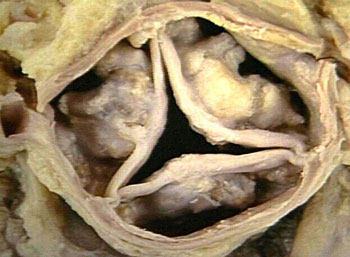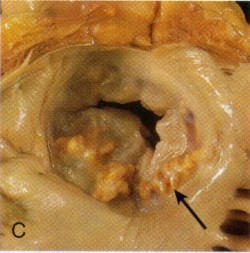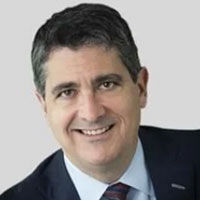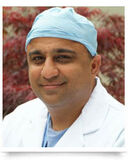“Do Calcium Supplements Accelerate Heart Valve Disease?” Asks Cheryl
Written By: Adam Pick, Patient Advocate, Author & Website Founder
Medical Expert: Eric Roselli, MD, Chief of Adult Cardiac Surgery, Cleveland Clinic
Page Last Updated: July 16, 2025
As I suffered from a calcified heart valve prior to surgery, I definitely perked up when I read this email from Cheryl of Ontario, Canada.

Calcified Aortic Valve (Aortic Stenosis)
Cheryl wrote to me, “Hi Adam – I have heard that some patients have been cautioned about the overuse of calcium supplements (including Rolaids) considering potential damage to heart valve leaflets. As so many patients, especially women, use supplements, I was curious to know your thoughts about calcium supplements. My calcium use was part of my history when I underwent a mitral valve repair and I wasn’t given any warning. What about other antacids such as Tums? Is this a cause of valve failure? Thanks, Cheryl”

Cheryl Irvine, Mitral Valve Repair Patient
After reading Cheryl’s question, I was really curious. That said, I reached out to Eric Roselli, M.D., one of the Cleveland Clinic’s leading heart valve surgeons.
In discussing this topic with Dr. Roselli, he noted, “Although it is a theoretical concern, there is no direct evidence to support the connection between excess calcium intake and the risk of degenerative aortic stenosis.”
Specific to Cheryl’s situation, Dr. Roselli noted, “If Cheryl had a mitral valve repair, I suspect she probably had degenerative mitral valve disease (commonly referred as mitral valve prolapse) and there is not even a theoretic concern for her and the use of calcium supplementation. If her primary care doctor believes she should be on calcium or vitamin D supplementation for potential osteoporosis, then – by all means – the history of a mitral valve repair for degenerative disease should not be a contraindication.”

Calcified Mitral Valve
I hope this helped all of us learn more about calcium supplements and heart valve disease.
Related Links:
- Does Vitamin K2 Prevent Calcified Heart Valves and Blocked Arteries?
- Calcium Supplements Could Spell Trouble for Older Heart Valve Patients
Keep on tickin!
Adam
|
Paul says on April 5th, 2010 at 3:21 pm |
|
We live in Paris, France, where the tap water’s hard and highly calcified: deposits build up really quickly in the kettle etc. When my wife’s aortic stenosis was advancing rapidly (she’s fine now after successful valve replacement last June) I often found myself wondering if this wasn’t contributing to the problem in some small way…seems logical to me…We drink only bottled water but it’d be a bit extravagant to use that for cooking… |
 |
|
Jim Hilbe says on April 5th, 2010 at 6:33 pm |
|
During our preoperative consultation with Dr.Lytle, Chairman of the Heart and Vascular Institute at The Cleveland Clinic, in July, 2009, we discussed my wife’s calcified aortic valve, and specifically, calcium supplements. Dr. Lytle asked, “do you have ostoporosis? I do.” Dr. Lytle went on to say that of the patients that suffer early valve replacement failure, ALL of them were taking calcium supplements. I asked Dr. Lytle whether any blind experiments have been don to conclusiely prove or disprove that calcium supplements cause valve calcification, he stated that it would be necessary to follow a statistically significant pool of patients over an extended period of time, and that the valves are constantly in a state of being superseded by newer models, making it impractical to conduct such a study. When we returned to our hotel, I tossed the calcium supplemtns into the wastebasket. |
 |
|
nancy mallinger says on April 5th, 2010 at 8:14 pm |
|
I also had aortic valve replacement at the Cleveland Clinic– my valve was very calcified. I had been taking 1500 mg of Oscal daily because of osteoporosis. When I met with my surgeon before the procedure (Dr. Gosta Pettersen), he asked if I had consumed a lot of dairy products, and when I said no, he asked about the calcium supplements. When I told him how much I took, he raised his eyebrows, but did not say any more. I have often wondered if there was a link. I have decreased my intake to 1000 mg a day, but wonder if this is still too much. Any thoughts? |
 |
|
Mary says on April 6th, 2010 at 9:12 am |
|
I’m so glad other people thought to ask their surgeons this question. My son, Danny, is having an aortic valve replacement in a few months and I asked the Surgeon if he should decrease the amount of milk he drinks due to this concern. She was very kind but I could see she thought this an irrelevant question. When you are facing another open heart surgery, you want to do anything and everything you can to delay that date. I’m especially concerned because at age 19, there is already a concern with increased calcification on tissue valves in young adults. Thank-you to everyone for your comments! |
 |
|
REx Horwood says on April 8th, 2010 at 9:28 am |
|
Six weeks ago on 23rd February I had my aortic valve replaced with a mechanical device. I was lucky enough to have the surgery performed by the world renowned Professor Stephen Westaby, an absolutely brilliant man: # Ray C. Fish Award for Scientific Achievement – Texas Heart Institute (2004) As I have come to know to mere mortals my operation is unimaginable, to Professoer Westaby it was, in his words “straight forward” He completed his part of the operation in less than 30 minutes, probably the fastest it ever could be done and I woke up about 3 and a half hours after I was put to sleep. For me it was indeed straightforward. There followed a horrible wee k when one moment I felt fine and the next I thought I was dying. Luckily my wife supported me throughout thistime. It seemed to go on forever because I could hardly rest or get any sleep. It was only afterwards that I came to realise that the reason for this was the high level of adrenaline my body was producing. I think that this is because when you are cut open the body immediately senses the attack, and although the response is controlled during the operation the level of adrenaline continues for weeks after this, In fact I still feel and act extremely hyper because of the continuing high levels of adrenaline. Whilst I try to relax I find it virtually impossible, and if I just ilie in bed I can feel the adrenaline rushing round my body. Quite extraordinary and hard to describe. I am 60 and other than the aortic stenosis and being a bit overweight, 15 stone instead of 13, I was relatively fit. I now feel fitter than I have done for at least 10 years and since the operation have lost 2 stone, apparently it takes about 1 year to get over most of the effects of the operation. The two main things I have been told are: 1) Do not worry about atrial fibrillation. After the operation the heart gradually reverts to normal and any changes made due to high work load gradually decrease. so withi a year your heart returns to normal. Currently I am on 5 tablets, the main one being Warfarin. This controls the thickness of the blood, needs to be checked regularly, and is required to ensure the metal heart valve and the blood work well together. The other 4 pills are digoxin, amlovasc, furosemide and simvastatin. Simvastatin is for controlling the level of cholesterol and can be changed when a blood test shows the need. amlovasc is for high blood pressure and that will soon be unnecessary as my heart returns to normal. Digoxin is a cardiac glycoside which your doctor can use to control your heart rate as they see fit. Finally Furosemide, I am told is a water tablet. This I have only given post op and have not asked my doctor about yet. Anyway in time my pills may just become 1, warfarin for the blood thickness. I will have to wait to find out. Good luck to everyone who needs surgery, My doctors were all extremely reassuring and were all right. So in my position I was in a very positive frame of mind before, during and after surgery. |
 |
|
REx Horwood says on April 8th, 2010 at 9:32 am |
|
I forgot to mention the second peice of advice from Professor Westaby. Whatever anybody says if any dentist does work on your teeth you must take oral anti biotics. This is the only way to ensure that bacteria are unable to attack and affect the new metal heart valve. Other than that everything will be fine |
 |
|
REx Horwood says on April 8th, 2010 at 9:35 am |
|
I have just read a couple of comments where people are worried re taking calcium. This was never an issue with me, no doctors ever mentioned, and I do not think anybody need worry about. But obviously if you are ask your doctor at the time. best wishes Rex |
 |
|
Shelby Hudgens says on April 8th, 2010 at 11:11 am |
|
One interesting fact I came across as I was doing research on valve calcification is that a magnesium deficiency will cause calcium to deposit on soft tissues, like valves. The study I read primarily focused on brain calcification, but the author surmised the same mechanism would occur elsewhere in the body. Increasing magnesium intake should slow valve calcification. |
 |
|
Richard says on February 19th, 2012 at 10:50 am |
|
I was diagnosed with moderate aortic stenosis 8 years ago. I have been taking a 600mg calcium supplement for at least 8yrs or more. My heart doctor has never mentioned that I should stop but I can not be sure I ever mentioned to him that I do take a calcium supplement. Is there any data to show that this can be a cause of my aortic stenosis. I am 77 years old and was diagnosed when I was 69 when my primary doctor heard a murmur. Thank you for any advice. |
 |
|
Jeanette says on July 27th, 2012 at 6:07 pm |
|
I’ve read that supplementation with magnesium is far more important than calcium. Google Linas Pawling (sp?). I was personally advised, by a well known doctor who has published books on diet and heart disease, not to have more than a cup of nonfat dairy a day…I’ve also read that MK-7 supplements (a form of K2) are supposed to help direct calcium into the bones, and away from the arteries..I take 400 mg. of magnesium every day. It also helps with night time leg cramps! I no longer take any calcium other than what I get from my diet, and I am a 59 year old woman! By the way, another well known physician stressed the importance of weight bearing exercise to strengthen my bones! I walk, quickly, every day, for several miles. |
 |
|
MARK says on July 28th, 2012 at 8:40 am |
|
I have an Aorta Valve replacement with a mechanical valve on Dec. 2009.Does calcium i am taking like Calcium Gummy Bears with Vitamin D3 has any comlication with my Aorta Valve as i have read on the internet that it has a contradiction thatcould cause a stroke. |
 |
|
DR VAN BEVEREN says on January 30th, 2013 at 2:48 pm |
|
Stenosis is often caused by DEPOSITS of calcium crystals on the leaflets. This can be due to several physiological and biochemical processes which incl;ude but is not limited to calcium. First, calcium is ubiquitis in Mother Nature. It is found in all food not distorted by people. There is PLENTY of calcium if you eat food. The problem is not GETTING it. The problem is keeping it and keeping it according to your body’s needs. Remember that calcium (which is VERY dynamic) comes and goes in and out of the body very quickly and that the incomings must equal the outgoings. It is used for a variety of organs most of which you can probably name: nails, teeth, skin, hair, bones, etc. Keeping it BETWEEN the cells as a way of “glue-ing” the cells together is a very DYNAMIC process as it must be replaced at a faster pace than, say, in the teeth or nails. It MUST be kept in between the cells so as not to compromise their spatial relationship – as they easily float away from each other in boils, abscesses, fever sores, cysts, fibroids, etc. How does this happen? |
 |
|
Peter Willard says on March 8th, 2014 at 2:15 pm |
|
It seems spilt on to take refined calcium or not. |
 |
|
Peter Willard says on August 6th, 2014 at 9:37 am |
|
Adam thank you for this web site. |
 |
|
Episolve GI Natural_Antacid says on November 30th, 2015 at 11:44 pm |
|
There is some evidence of calcium supplements and CAD that needs to be further studied |
 |
|
llewellynh says on April 14th, 2016 at 4:52 pm |
|
And thank you Dr. Roselli who I know first hand is an ultra busy but terrific surgeon. Your time and thoughts help me more than you will even know. |
 |













